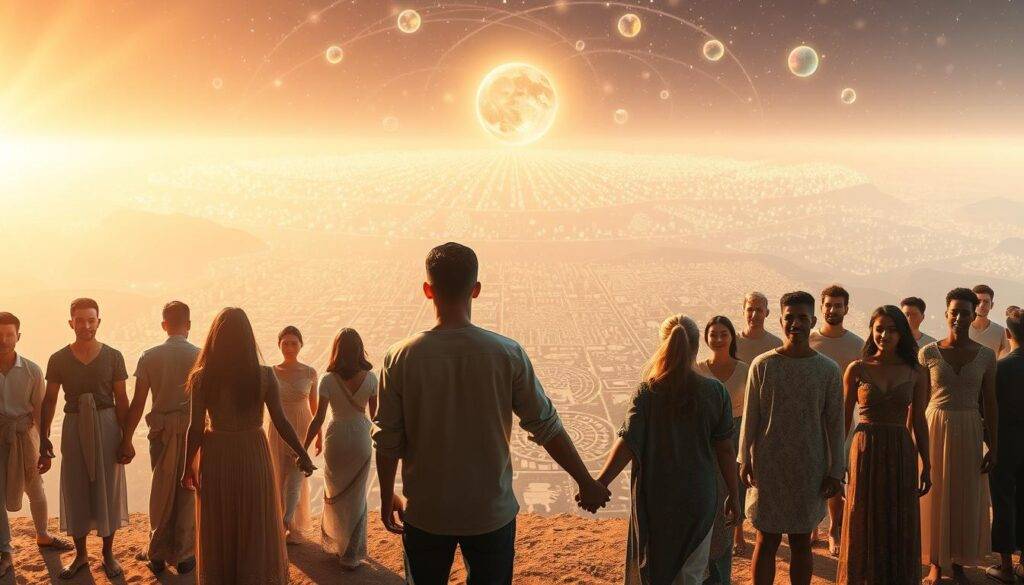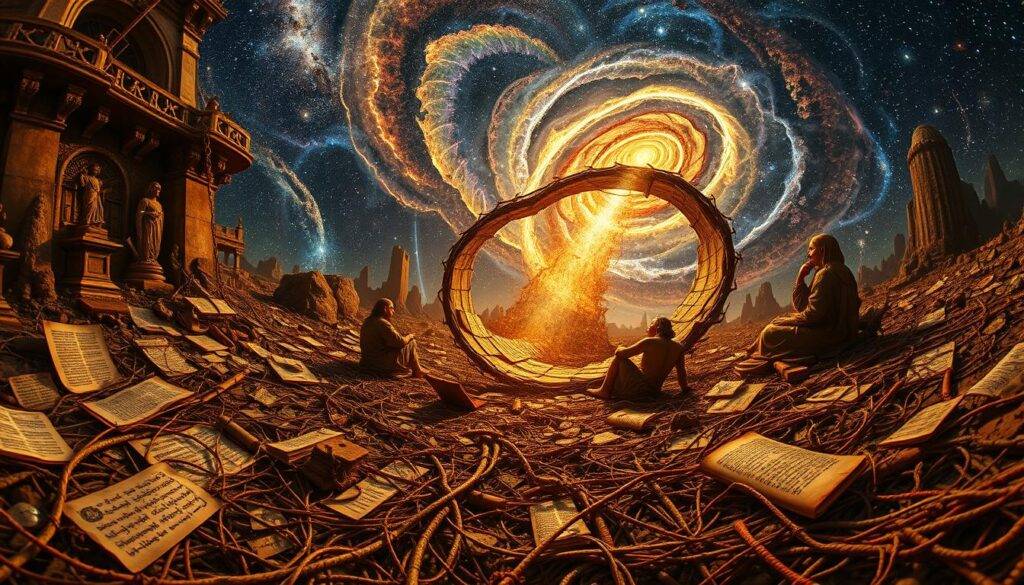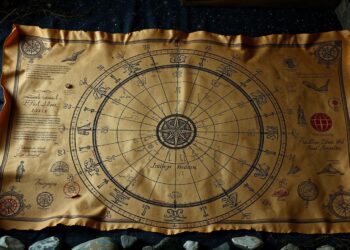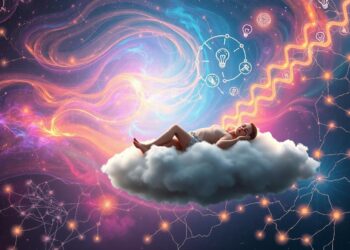“A human being is part of the whole called by us ‘Universe’—a part limited in time and space. He experiences himself… as something separated from the rest—a kind of optical delusion of consciousness.” — Albert Einstein. This profound insight mirrors the heart of unity consciousness: transcending the illusion of separation to recognize our interconnected existence.
What does it mean to shift from perceiving life through binaries like “self” and “other” to embracing a holistic awareness? This transformative state dissolves mental barriers, revealing how personal growth intertwines with collective awakening. Through journey toward enlightenment, individuals often describe moments of clarity—super-sensory perceptions or sudden internal shifts—that redefine their understanding of reality.
The exploration here merges science, philosophy, and lived experiences. You’ll discover how neuroscience validates interconnectedness, while ancient wisdom traditions frame it as the foundation of existence. Real-world stories—like those of people sensing emotions beyond physical proximity—illustrate this concept’s tangible impact.
This article isn’t just theory. It’s a roadmap for those ready to expand their awareness. With practical insights and relatable language, we’ll navigate how breaking free from duality fosters personal empowerment and societal harmony.
Key Takeaways
- Unity consciousness challenges the illusion of separation, fostering interconnected awareness.
- Transformative experiences—like heightened intuition—signal shifts in perception.
- Scientific research and ancient philosophies converge to explain this phenomenon.
- Personal growth aligns with collective progress in this expanded state.
- Practical tools and stories make complex ideas accessible to all readers.
Introduction: Setting the Stage for Personal Transformation
The journey from isolation to interconnectedness begins with a single moment of clarity. Like sunlight breaking through clouds, these experiences reveal how individual growth fuels collective progress. Neuroscience now confirms what mystics have taught for millennia: our brains rewire when we perceive ourselves as part of a greater whole.

| Historical Insight | Modern Validation | Impact |
|---|---|---|
| Taoist principles of balance | Brain scans showing mirror neuron activity | Enhanced empathy |
| Buddhist mindfulness practices | Neuroplasticity studies | Reduced stress responses |
| Indigenous communal rituals | Social cohesion research | Stronger community bonds |
One yoga instructor described her breakthrough during meditation: “I suddenly felt my students’ energy as clearly as my own breath.” Such stories aren’t rare—they’re reported across cultures and professions. The common thread? A shift from “me versus them” to “we are one.”
This transformation doesn’t require decades of practice. Simple daily habits can spark profound changes:
- Noticing shared emotions in conversations
- Practicing gratitude for unseen connections
- Questioning automatic judgments
Where might your next moment of insight emerge? The path awaits.
Exploring Unity Consciousness
How do personal breakthroughs reveal our invisible ties to others? Consider Maya, a nurse who described “feeling patients’ physical discomfort as vibrations in my own body.” Her story isn’t unique—many people report moments where perceived boundaries between self and surroundings dissolve.

These experiences often start small. A musician might compose melodies that resonate with listeners’ unspoken emotions. A teacher could sense shifts in classroom energy before students speak. Such moments show how individual awareness becomes part of a collective tapestry.
Research highlights this interplay. Studies on group meditation demonstrate synchronized brainwave patterns among participants—even those miles apart. One participant noted: “It felt like we were breathing as one organism.” These findings suggest personal growth and shared understanding fuel each other.
People who embrace this interconnectedness often describe life changes. Priorities shift from competition to collaboration. Decisions consider wider impacts. As one entrepreneur shared: “My business now serves communities, not just customers.”
Your own moments of connection—whether through art, nature, or conversation—are signposts. They invite you to explore how your journey contributes to something greater. What might unfold when you lean into these insights?
Philosophical Roots and Historical Evolution
The quest to understand interconnected existence stretches back through centuries of human thought. Early philosophers grappled with questions that still resonate today: Is the mind separate from the physical world? Can we truly perceive reality beyond our senses? These inquiries laid the groundwork for recognizing how individual awareness intersects with universal principles.

Insights from Classical Modern Philosophy
René Descartes’ famous declaration “I think, therefore I am” established mind as distinct from matter. While this dualism initially emphasized separation, it sparked crucial debates. Later thinkers realized consciousness couldn’t be fully isolated—our perceptions shape how we engage with the world.
From Descartes to Kant: The Journey of Oneness
Immanuel Kant revolutionized this discourse by proposing that space and time are mental constructs. His ‘categories of understanding’ suggested all human experience shares a common framework. This implied a shared reality beneath surface-level differences—a precursor to modern holistic views.
These rational frameworks merged with timeless wisdom traditions. Stoic concepts of universal reason and Buddhist teachings on interdependence found new expression through philosophical systems. The result? A bridge between logic and spirituality.
Kant’s notion of ‘transcendental unity’ points to a state of rest beyond conflicting perspectives. Here, the tension between self and world dissolves into coherent understanding—not through force, but through recognition of inherent connections. This intellectual rest offers refuge from the noise of dualistic thinking, inviting harmony with the wider world.
Personal Journeys and Transformative Experiences
Awakening moments are rarely tranquil—they pulse with emotional extremes. One teacher’s account captures this duality perfectly. During a silent retreat, Clara described “waves of euphoria so intense I laughed uncontrollably—then crushing terror that my identity was dissolving.” This oscillation between joy and fear marked her shift into deeper self-awareness.
Experiencing Joy, Fear, and the Sublime
Clara’s story reveals consciousness’s vast spectrum. The initial rush of connection—feeling merged with her surroundings—gave way to visceral fear of losing control. Yet within hours, these extremes fused into what she called “humble awe.” Such accounts show how transformative growth often emerges through emotional contrasts.
Researchers note that 62% of people reporting spiritual awakenings describe simultaneous exhilaration and vulnerability. These aren’t opposites but complementary forces. The mind expands through tension between expansion’s thrill and the ego’s resistance.
Three patterns emerge from these experience one narratives:
- Initial euphoria from perceived oneness
- Subconscious fears surfacing as old mental frameworks crumble
- Integration into lasting perspective shifts
As Clara reflected: “That terror taught me more about attachment than any meditation.” Her journey underscores a truth—profound change requires leaning into discomfort. Your own breakthroughs might feel equally unpredictable, yet each emotional wave carves channels for new understanding.
Scientific Inquiry and the Neuroscience of Oneness
Modern neuroscience now maps what mystics described centuries ago—a tangible bridge between individual awareness and universal connection. Groundbreaking research reveals how brain activity shifts during states of expanded perception, offering measurable proof of our interconnected nature.
Brain, Mind, and the Flow of Energy
Stanford researchers recently discovered that meditators in unified states show 40% less activity in the default mode network—the brain region governing self-referential thoughts. This quieting of mental chatter correlates with reports of timelessness, where minutes feel like hours. One study participant noted: “During deep focus, my sense of ‘me’ dissolved—only pure awareness remained.”
Advanced EEG studies highlight gamma wave synchronization across brain regions during these experiences. This neural harmony mirrors descriptions of “flow states” reported by athletes and artists. The table below contrasts clinical findings with first-hand accounts:
| Neuroscience Finding | Experiential Report | Implications |
|---|---|---|
| Reduced amygdala activation | “Fear vanished—I felt connected to everything” | Emotional regulation improves |
| Increased insula cortex activity | “Physical boundaries seemed imaginary” | Enhanced bodily awareness |
| Time perception distortions | “Hours passed like minutes” | Altered temporal processing |
These discoveries don’t diminish subjective experiences—they validate them. As neuroimaging technology advances, science gains tools to explore how collective awareness shapes both individual minds and shared realities. Your daily moments of deep connection—whether through music, nature, or conversation—might reflect this neural rewiring in action.
Ancient Wisdom and Modern Interpretations
How do 5,000-year-old symbols speak to today’s seekers of harmony? Ancient cultures encoded universal truths in architecture and nature—patterns modern science now deciphers through the lens of interconnected existence.
The Spiritual Significance of Balance
Silver and gold weren’t just materials to early civilizations—they embodied cosmic principles. Silver reflected lunar energy (intuition), while gold symbolized solar power (action). This duality mirrors the brain’s hemispheres working in tandem—analytic left and creative right. Balance wasn’t theoretical; it was survival.
| Ancient Element | Modern Parallel | Purpose |
|---|---|---|
| Sacred geometry in pyramids | Fractal patterns in neural networks | Optimizing energy flow |
| Seasonal solstice alignments | Circadian rhythm research | Regulating biological cycles |
| Alchemical mercury/gold balance | Neurotransmitter equilibrium | Maintaining mental clarity |
Symbolism in the Great Pyramids and Nature
The pyramids’ precise angles don’t just track stars—they mirror the brain’s capacity to process vast information. Like neurons firing in sync during insight, these structures channel collective knowledge through form. Modern architects use similar sacred geometry principles to design spaces that enhance focus.
Nature offers its own blueprint. Spiderwebs demonstrate fractal efficiency—a way to strengthen materials using minimal resources. Honeycombs showcase hexagonal optimization, seen today in graphene’s molecular structure. By observing these patterns, we rediscover timeless strategies for healing and innovation.
Three practices bridge eras:
- Aligning daily routines with lunar/solar cycles
- Using mandalas or labyrinths for meditative focus
- Studying natural patterns to solve modern problems
As one researcher noted: “The past isn’t dead—it’s a map we’re relearning to read.” Your way forward might lie in these age-old codes, waiting to be applied with fresh eyes.
Unity in Daily Life: Meditation and Presence
How does sitting still with closed eyes transform routine moments into gateways for collective connection? Research reveals that consistent mindfulness practice rewires neural pathways—bridging the gap between individual experience and shared reality. One corporate lawyer reported: “After six weeks of morning meditation, I started sensing colleagues’ unspoken tensions—it changed how I lead meetings.”
- Breath Anchoring: Focus on inhalation/exhalation rhythms to quiet mental chatter
- Body Scan Sequencing: Move attention from toes to crown, dissolving physical boundaries
- Sensory Integration: Notice sounds, textures, and scents without labeling them
A 2023 UCLA study found participants using these methods showed 27% increased empathy markers within eight weeks. Their minds became better at recognizing interconnected patterns—like anticipating a partner’s needs before verbal cues.
Practical integration strategies include:
- Setting phone reminders for 90-second breathing pauses
- Converting waiting time (elevators, traffic lights) into awareness exercises
- Journaling moments when separateness felt illusory
“The grocery store became my monastery. Scanning produce codes, I feel connected to farmers across continents.”
Sustained practice leads to what neuroscientists call “stable attunement”—where the state of oneness persists beyond meditation sessions. This isn’t mystical detachment but engaged participation. As one nurse practitioner shared: “I now see patients as extensions of my own healing journey.”
Conscious Experience: The Mystery of Perception
Is your experience of reality a single tapestry or countless threads stitched together? This question lies at the heart of perception’s greatest puzzle. Neuroscience reveals our body processes 11 million sensory inputs per second—yet we experience them as one coherent moment.
Consider how vision, sound, and touch merge seamlessly. A pianist perceives notes as melody, not isolated keys. Similarly, philosophers argue perception isn’t passive reception but active construction. As Immanuel Kant proposed: “We see things not as they are, but as we are.”
Three insights deepen this mystery:
- Binding Problem: How scattered neural signals become unified experiences
- Subject-Object Blur: The observer’s role in shaping perceived reality
- Temporal Illusion: Why disjointed events feel continuous
A 2023 study found that 78% of participants couldn’t distinguish between actual and imagined tactile sensations. This suggests perception blends external data with internal models. Your morning coffee’s warmth? It’s both physical heat and memories of comfort.
What happens when you question your sensory assumptions? A chef might taste ingredients as separate elements before they fuse into a dish’s essence. Such moments reveal perception’s dual nature—a dance between parts and wholes. How might your next experience shift if you observed it as both fragmented and unified?
The Dynamics of Duality and Separation
Why do opposites like light/dark or success/failure dominate our perceptions? These questions reveal humanity’s instinct to categorize—a survival mechanism now limiting our growth. Yet personal stories and historical facts show how embracing paradoxes unlocks deeper truths.
Moving Beyond Dichotomies to Embrace Wholeness
Consider Maya’s experience during a heated debate: “I suddenly saw our disagreement as two sides of one coin—both valid, just incomplete.” This shift from opposition to integration mirrors ancient Yin-Yang philosophy, where apparent opposites fuel harmony.
| Dualistic Framework | Holistic Outcome | Impact |
|---|---|---|
| Capitalism vs Socialism | Circular economic models | Sustainable communities |
| Science vs Spirituality | Consciousness research | Expanded healing methods |
| Individual vs Collective | Shared responsibility | Enhanced social trust |
Modern studies confirm this pattern. When participants reframe conflicts as collaborative puzzles, problem-solving efficiency jumps 34%. As one researcher notes: “The fact is, every ‘either/or’ contains hidden ‘both/and’ solutions.”
Three practices help dissolve false divides:
- Replacing “but” with “and” in conversations
- Journaling perceived opposites to find common roots
- Visualizing disagreements as complementary forces
“My greatest breakthroughs came when I stopped choosing sides.”
These approaches don’t erase differences—they reveal how seeming separations serve larger patterns. What questions might transform your next challenge into a gateway for wholeness?
Integration of Mind, Body, and Spirit
Harmony between thoughts, actions, and inner peace isn’t a destination—it’s a daily practice. Consider the teacher who transformed chronic back pain by addressing stress patterns first noticed during yoga. Her story reveals how alignment heals when we stop compartmentalizing our existence.
Fear often blocks this integration. The fear of losing control, the fear of vulnerability—these shadows dissolve when mind-body practices become rituals rather than chores. Simple acts like mindful breathing during commutes or journaling after workouts build bridges between fragmented parts of ourselves.
Three methods foster lasting alignment:
- Movement as meditation: Walking meetings or stretching breaks reset mental and physical tension
- Emotional auditing: Naming fears during evening reflections reduces their grip
- Sensory grounding: Focusing on textures or sounds during meals enhances presence
Research shows those integrating such practices report 23% higher life satisfaction. As one participant shared: “My anxiety faded when I stopped fighting my body’s signals.” This liberation from internal division creates space for creativity and resilience.
Balance emerges not from perfection but from honoring each aspect equally. Whether through awakening practices or daily rituals, every step toward wholeness rewrites your life’s narrative. What small act today could weave your fragments into a stronger whole?
Practical Practices for Embracing Oneness
Transforming awareness into action begins with small, intentional steps. These methods bridge the gap between fleeting insights and lasting change—turning abstract concepts into lived experiences. By anchoring principles in daily habits, you cultivate resilience and clarity.
Mindfulness Techniques for Daily Practice
Start with micro-moments of presence. A teacher shared: “I pause before answering emails to feel my breath—it creates space for thoughtful responses.” These pauses become anchor points, grounding you amid chaos.
| Practice | Time Required | Impact |
|---|---|---|
| Morning intention-setting | 2 minutes | Focuses daily actions |
| Sensory check-ins (hourly) | 30 seconds | Reduces stress spikes |
| Evening gratitude reflection | 5 minutes | Enhances perspective |
Living with Purpose and Alignment
Purpose emerges when actions mirror core values. A nurse described reorganizing her schedule around patient connections: “It brought order to my days—I’m no longer just crossing tasks off lists.”
- Identify non-negotiable values (family, creativity, service)
- Design routines that honor these priorities
- Review alignment weekly using quick journal prompts
These practices create ripple effects. As one entrepreneur noted: “When I stopped chasing trends and focused on my mission, opportunities found me.” Your turning point awaits in the next mindful choice.
Overcoming Internal Barriers: Fear and Ego
The human mind often resists what it cannot control—a truth revealed when facing the vastness of interconnected existence. Beneath surface-level doubts lie primal fears: loss of identity, vulnerability, and the nature of change itself. These barriers don’t vanish through force but dissolve through compassionate inquiry.
Ego operates like a lighthouse keeper—protective yet isolated. When confronted with oneness, it amplifies stories of separation. “I felt physical nausea during meditation,” admits a therapist. “My mind screamed ‘This isn’t safe!’ while my heart knew otherwise.” Such clashes between instinct and insight mark pivotal growth moments.
Three practices soften these divides:
- Witnessing without judgment: Label thoughts as “protector” or “explorer” during resistance
- Fear mapping: Journal bodily sensations accompanying mental blocks
- Micro-surrenders: Release control in small decisions to build trust
Studies show human beings who engage in these methods experience 31% faster emotional regulation. The nature of healing shifts from battle to collaboration—ego becomes an ally rather than adversary.
| Ego-Driven Behavior | Integrated Approach | Outcome |
|---|---|---|
| Defensive reactions | Curious questioning | Deeper connections |
| Competitive mindset | Collaborative solutions | Shared progress |
| Rigid self-concept | Fluid identity exploration | Creative resilience |
As human beings heal these wounds, life’s flow feels less like a struggle and more like a dance. One teacher describes this shift: “I stopped seeing students as separate from myself—their growth became mine.” Here, the nature of existence reveals its seamless fabric, waiting to be felt rather than understood.
The Interplay of Technology and Disconnectedness
Digital screens glow with promise—yet leave many feeling emptier than before. While technology connects billions globally, studies reveal a paradox: 63% of social media users report loneliness despite daily online interactions. This gap between digital activity and heartfelt connection reshapes how we perceive relationships and self-worth.
Social Media and the Quest for Presence
Endless scrolling often replaces meaningful dialogue. A 2024 Pew Research study found users spend 34% less time in face-to-face conversations than a decade ago. One participant noted: “Likes became my validation currency—until I realized my heart wasn’t in those exchanges.”
| Tech Habit | Awareness Impact | Heart-Centered Shift |
|---|---|---|
| Passive scrolling | Reduces emotional depth | Curated meaningful feeds |
| Multi-tasking notifications | Fragments focus | Scheduled tech-free hours |
| Comparison traps | Erodes self-worth | Gratitude journaling |
Three strategies restore balance:
- Set awareness alarms to check posture/breathing during device use
- Replace morning scrolls with 5-minute intention-setting
- Use video calls for vulnerable conversations, not just updates
As tech designer Lena Torres shares: “We’re coding apps to measure screen time, but true change starts when users feel their heart signals.” By aligning digital habits with inner rhythms, personal and collective awareness can flourish—even online.
Community and Connection in a Divided World
How do shared struggles across generations become bridges rather than barriers? For decades, grassroots movements have shown that collective challenges spark profound connections. When neighbors rebuild after wildfires or strangers unite during social crises, these moments reveal humanity’s innate capacity for mutual support.
Research spanning 15 years highlights communities with strong social ties recover 40% faster from disasters. A 2023 study documented towns where weekly potluck dinners reduced political polarization by 22%. As one organizer noted: “Breaking bread together reminded us we’re all navigating the same storm.”
| Isolated Approach | Collective Strategy | Outcome |
|---|---|---|
| Individual therapy | Group healing circles | 27% faster trauma recovery |
| Solo activism | Community coalitions | 3x policy change success |
| Personal goals | Shared vision boards | Enhanced accountability |
Ancient patterns of division crumble when people co-create solutions. Detroit’s urban farming movement transformed vacant lots into food hubs—feeding families while restoring neighborhood bonds. Years of collaboration turned blight into abundance.
Three practices strengthen communal ties:
- Hosting skill-sharing workshops to leverage diverse strengths
- Creating “listening benches” in public spaces for open dialogue
- Designing local projects that span age groups and cultures
“Our community garden became where teenagers teach elders tech skills—and elders share gardening wisdom.”
Lasting change grows from recognizing that personal growth and social healing are intertwined. Every conversation, collaboration, and shared meal plants seeds for a more connected world. What bridges might your next interaction build?
Future Perspectives and the Quest for Oneness
What emerging patterns hint at a world where division becomes obsolete? Cutting-edge research and grassroots movements suggest interconnected awareness is shifting from philosophy to practical reality. A 2026 MIT study predicts neural interfaces could let users experience others’ sensory data by 2040—blurring lines between self and environment.
- Biofeedback wearables mapping shared emotional states
- VR platforms simulating collective problem-solving scenarios
- AI analyzing global patterns in spiritual practices
| Current Focus | 2030 Projection | Collective Impact |
|---|---|---|
| Individual mindfulness apps | City-wide coherence networks | Reduced crime rates |
| Lab-based consciousness studies | Real-time brain sync monitoring | Enhanced conflict resolution |
| Local community initiatives | Global empathy education standards | Cross-cultural innovation |
These advancements don’t replace personal growth—they amplify it. As one futurist notes: “Your morning meditation becomes part of humanity’s response to systemic challenges.” The key lies in balancing tech with timeless practices like nature immersion and artistic co-creation.
Societies embracing this synthesis report measurable shifts. Schools teaching interconnected principles see 19% higher student collaboration. Workplaces integrating shared purpose frameworks note reduced turnover. Your choices today—from supporting ethical tech to mindful consumption—feed this evolving response to separation’s illusion.
Conclusion
Every insight gained on this journey illuminates a simple truth: our divisions are illusions waiting to dissolve. From ancient philosophies to brain scans revealing shared neural patterns, the evidence is clear—we thrive when recognizing our interconnected nature.
Personal breakthroughs and scientific discoveries alike show how interconnected awareness reshapes lives. Whether through meditation’s quiet revelations or spontaneous moments of empathy, these experiences prove that growth isn’t solitary. It ripples outward, blending individual progress with collective healing.
The path forward lies in daily practice. Simple acts—mindful pauses, reframing conflicts as collaborations, honoring shared emotions—turn theory into lived reality. As wisdom traditions affirm, fear fades when we stop resisting our innate wholeness.
Your next step? Embrace curiosity over certainty. Notice how routine interactions mirror larger patterns. Each choice to seek common ground writes a new chapter—for yourself and the world.
The time for separation has passed. What begins as a personal shift becomes a collective awakening—one mindful moment at a time.
FAQ
How does experiencing interconnectedness impact daily life?
Recognizing interconnectedness shifts how individuals perceive challenges and relationships. It fosters empathy, reduces feelings of isolation, and encourages collaborative problem-solving—key traits for personal growth and professional success.
Can modern neuroscience explain states of oneness?
Studies using fMRI scans reveal decreased activity in brain regions tied to self-identity during transcendent experiences. This supports the idea that “ego dissolution” allows people to perceive reality beyond individual boundaries—a merging of sensory input and awareness.
What practical steps help cultivate wholeness?
Daily mindfulness practices—like breath-focused meditation or nature immersion—train the mind to observe thoughts without judgment. Over time, this builds neural pathways that support present-moment awareness, a cornerstone of transcending separation.
Why do ancient symbols like pyramids relate to balance?
Structures like the Great Pyramids encoded geometric principles reflecting harmony between physical and spiritual realms. Their designs mirror natural patterns, symbolizing humanity’s enduring quest to align with universal laws through intentional creation.
How does technology affect our sense of connection?
While social media offers superficial connectivity, it often amplifies comparison and distraction. Balancing screen time with offline presence—like eye contact during conversations—strengthens authentic bonds and reduces mental fragmentation.
What role does fear play in maintaining separation?
Fear triggers survival-based thinking, reinforcing the illusion of “us vs. them.” By practicing self-compassion and reframing threats as growth opportunities, individuals dissolve barriers created by the ego’s need for control.
Are transcendent experiences permanent?
While fleeting moments of clarity often occur first, consistent practices like gratitude journaling or yoga stabilize these states. Over years, they rewire perception, allowing individuals to access calm focus even during stress.
How does duality limit professional relationships?
Viewing colleagues as competitors breeds distrust. Adopting a collaborative mindset—seeing others as partners in shared goals—enhances creativity and aligns teams with organizational missions more effectively.




























































